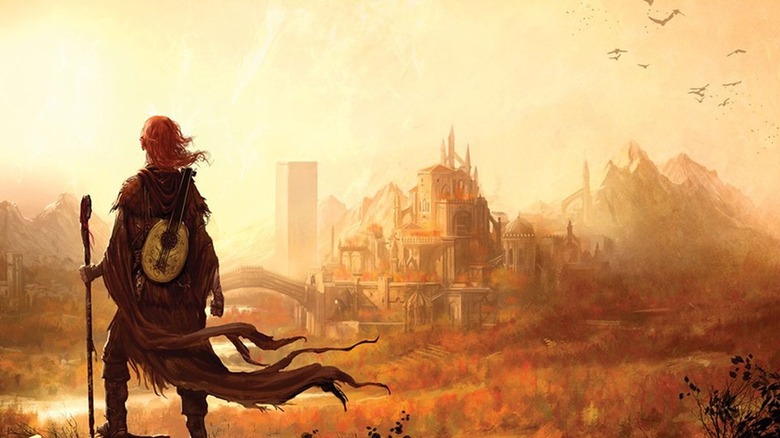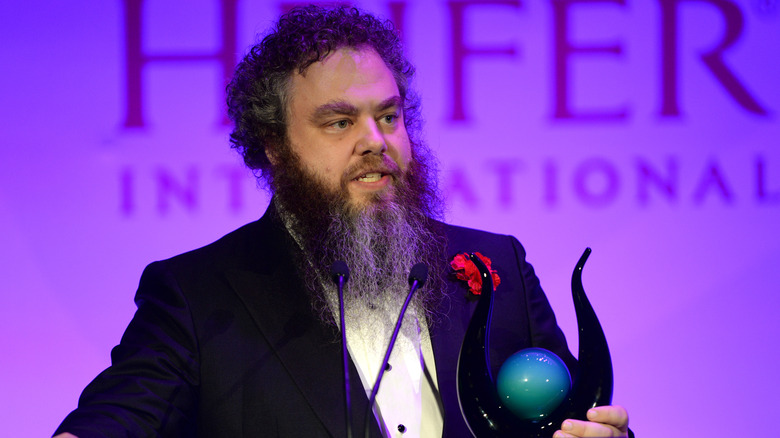The Rise And Fall Of The Kingkiller Chronicle Series Should Be A Lesson For All Fantasy Writers
Fans of "A Song of Ice and Fire," the fantasy series by George R.R. Martin (upon which "Game of Thrones" is based), know just how torturous it is to wait for a forthcoming book in a series when there's no release date in sight. That said, fans of the "The Kingkiller Chronicle" series might want to have a word with those desperate "ASOIAF" fans.
If you haven't heard of "The Kingkiller Chronicle," please feel free to buckle up. You're in for quite the ride. Written by Patrick Rothfuss, the intended trilogy — please note the very calculated and specific use of the word "intended" here — hit shelves in 2007 with "The Name of the Wind." Book 2, "The Wise Man's Fear," followed that up in 2011 after an extended but reasonable delay. That said, the third book is still nowhere to be found, and "The Doors of Stone," as of this writing, hasn't been released yet ... nor is there any word about when that might happen. A few years ago, that didn't stop Hollywood from jumping at the opportunity to shower Rothfuss with cash and attempt to develop an adaptation of his popular (unfinished) series. And yet ... "The Kingkiller Chronicle" series remains as nonexistent as "The Doors of Stone" despite several high-profile attachments and millions of readers champing at the bit to see it.
So what exactly happened with "The Kingkiller Chronicle"? Where's that third book, and what can fantasy writers, aspiring and otherwise, learn from Rothfuss' messy journey?
What's the deal with The Kingkiller Chronicle anyway?
In case you're not one of this series' devoted fans, here's a quick recap of what "The Kingkiller Chronicle" is even about. The two books, which use a framework of an oral history told by the main character to a "chronicler," tell the story of Kvothe, who might be a simple innkeeper in the story's present day but was a wizard and musician known as the "Kingkiller" in the past. Set in the world of Temerant — which itself is a part of the Four Corners of Civilization — the first two books were decently big hits, even though "The Wise Man's Fear" arrived way later than anticipated (starting a trend already).
In the first book, which won a handful of notable awards, Kvothe tells the story of his difficult childhood and time spent in cities ravaged by crime, while in the second, he recalls his journey to learn more about his family as well as the evil Chandrian, among other magical forces. Fans, though, will have to wait to find out all of Kvothe's secrets ... potentially forever.
The Kingkiller Chronicle could have been the next big fantasy thing
With over 1 million copies sold of "The Name of the Wind" and the top spot on the New York Times Bestseller List for "The Wise Man's Fear," it's not at all surprising that Hollywood moved to get an adaptation off the ground. In the summer of 2013, it was reported that a group of writers and producers had optioned the project, but when the rights expired after a couple of years, it was anyone's to pick back up again. Enter Lin-Manuel Miranda, "Hamilton" scribe and Pulitzer Prize winner who, as a self-proclaimed megafan of Rothfuss' work, was set to produce a TV series based on "The Kingkiller Chronicle." This was, obviously, a huge get for Rothfuss; 2016 was the highpoint of "Hamilton" mania, and Miranda, fresh off a ton of wins at that year's Tony Awards, was the hottest commodity in the industry.
Miranda, who was reportedly also going to write original music for the series, was effusive with his praise for "The Kingkiller Chronicle" books. "I think fans of good writing just like 'The Name of the Wind,'" he told Vulture. "I had not read a lot of fantasy books at that point, but I read the first sentence and I just, I was very drawn in. I very rarely reread books, but I reread those books several times just to luxuriate in reading them and spending time in that world and with those characters." Speaking to Entertainment Weekly, he said his experience appearing in HBO's "His Dark Materials" helped him understand "The Kingkiller Chronicle," saying the series was "still a code that's waiting to be cracked." That code, apparently, eluded even Miranda's obviously sharp mind, and he left the project in 2022.
So what's the lesson for fantasy writers?
So why did the adaptation fall apart? Well, Rothfuss has been elusive about the third book in the promised trilogy for a while — to the point that many fans have abandoned hope of the series ever reaching any kind of satisfying conclusion. In fact, his own editor said she hadn't read a word of Rothfuss' work in years on a Facebook post, sowing seeds of doubt about whether or not any part of the book even exists. Rothfuss also reportedly raised money for charity by promising a new chapter, which, naturally, never materialized. All of this doesn't exactly instill confidence in Hollywood development execs — no matter how many copies a debut novel sold.
Rothfuss has addressed his lack of punctuality a few times, but the fact remains that maybe he should have stuck a little more closely to his deadline — or stuck to it at all. It definitely seems like Rothfuss didn't expect his first two books to blow up as much as they did, but he doesn't have the clout of a George R.R. Martin, who keeps dangling "The Winds of Winter" in front of his fans but doesn't face any huge consequences for his delays. Martin's earned his place in the pantheon of great fantasy writers — he's the Lev Grossman-dubbed "American Tolkien," after all — with decades of hard labor in the SFF trenches to his name. Rothfuss essentially entered the scene with "The Name of the Wind," so he doesn't have a lot of good will banked to support his cause as he keeps kicking the Book 3 can down the long and winding road.
It's likely that after "Game of Thrones" outstripped its source material, Hollywood is more likely to look askance at unfinished series. That certainly seems to be what happened to Rothfuss' project. This probably isn't the end of the road for "The Kingkiller Chronicle's" Hollywood journey — but it may be the end until the author produces a concluding book, and it's certainly the end of Miranda's involvement. Rothfuss had two bestselling books under his belt and one of the most popular artists on the planet ready to bring his story to the small screen, but he apparently couldn't deliver — and he lost out on a sparkling opportunity as a result.



